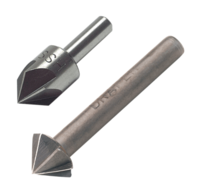Countersink Bits: Difference between revisions
From DT Online
mNo edit summary |
mNo edit summary |
||
| Line 3: | Line 3: | ||
They are available in a [https://en.wikipedia.org/wiki/Countersink range of point angles] but the most common for general purposes is 90°. Short fluted designs are chosen for working in metal and are made of [https://en.wikipedia.org/wiki/High-speed_steel '''High Speed Steel (HSS)'''] for this purpose. The longer '''Rose Countersink''' is made of [https://en.wikipedia.org/wiki/Carbon_steel '''Carbon Steel'''] but is often | They are available in a [https://en.wikipedia.org/wiki/Countersink range of point angles] but the most common for general purposes is 90°. Short fluted designs are chosen for working in metal and are made of [https://en.wikipedia.org/wiki/High-speed_steel '''High Speed Steel (HSS)'''] for this purpose. The longer '''Rose Countersink''' is made of [https://en.wikipedia.org/wiki/Carbon_steel '''Carbon Steel'''] but is often preferred for working in wood. | ||
Revision as of 21:54, 30 October 2015
Countersink Bits or drills, are used to Chamfer or bevel the edge of a drilled hole such that a Countersunk Head Screw can be seated flush with material surface.
They are available in a range of point angles but the most common for general purposes is 90°. Short fluted designs are chosen for working in metal and are made of High Speed Steel (HSS) for this purpose. The longer Rose Countersink is made of Carbon Steel but is often preferred for working in wood.
Rose Countersinks are also available fixed in a file handle so that they can be used by hand. This easier than changing the bit in the drill when only a few holes need countersinking in wood.
